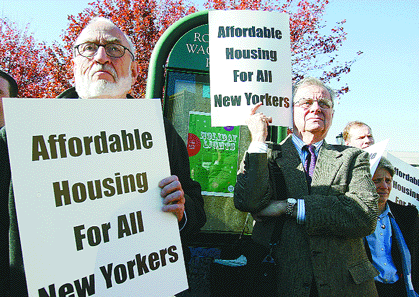By Josh Rogers
With pricey Ritz-Carlton condos to the left and a sign for luxury rentals to the right, two of the men behind the agreement to use Battery Park City money for affordable housing returned to the neighborhood Monday to say the 18-year-old promise is being broken.
“The city and state made a deal,” said Sandy Frucher, former president and C.E.O. of the Battery Park City Authority. “They abrogated that deal. It’s that simple.”
Frucher was joined at the Nov. 14 press conference by Richard Sirota, former B.P.C.A. chairperson. Both were running the authority in 1986, when the state Legislature voted to issue $400 million of affordable housing bonds that were backed by B.P.C. ground leases and payments in lieu of taxes (PILOTS). Originally the Battery Park City master plan called for 1/3 of the neighborhood apartments to be less than market rents, but the thought was more affordable units could be built around the city on less valuable land.
Frucher said the decision to build affordable housing away from B.P. C. was correct, but that if the city does not use B.P.C. revenues for the houing no one will ever believe government promises connected to development projects, such as the city’s plan for a Jets-Olympics stadium on the West Side. The West Side plan includes an estimated 4,000 affordable housing apartments.
A spokesperson for Mayor Mike Bloomberg did not return a call for comment. When he ran for mayor in 2001, Bloomberg and most of his campaign opponents favored using the B.P.C. money for affordable housing.
U.S. Rep. Jerrold Nadler, who organized the press conference, said it was too easy for the city to shift the money away from housing and the only way to insure it was used as intended was to put it in a dedicated housing fund. In 1989, the B.P.C. agreement was amended to allow the city to spend the money to fill budget gaps.
Bloomberg is implementing a plan to preserve or build 65,000 below-market apartments, but Frucher said that can’t be used to substitute for the B.P.C. promise.
“The idea was this [B.P.C. money] would be added in,” he said. “You weren’t supposed to subtract it from city revenues [for housing].”
After paying its operating and park maintenance expenses, the Battery Park City Authority turns over its excess revenue to the city every year. The authority, controlled by Gov. George Pataki, is expected to turn over $118 million to the city next year, and an advocacy group, Housing First!, estimates the annual revenue could finance $875 million worth of housing bonds to build about 15,000 housing units across the city.
Joe Weisbord, director of the housing group, said Bloomberg’s housing plan is a move in the right direction, but it’s not enough. “The mayor made a good step forward, but nobody ever said that was going to solve the city’s housing situation,” Weisbord said. “We need to do more.”
Part of the money that gets turned over to the city goes to a fund that is in effect controlled by the governor, mayor and William Thompson, the city’s comptroller.
At the press conference, Bertha Lewis of Acorn called on Thompson and “his cohorts” to stop “putting the money back into the slush fund.”
Thomspon’s spokesperson said the comptroller supports affordable housing and was reviewing whether he would continue to approve spending the B.P.C. money on other projects.
“He’s been saying some version of that for a long time,” Weisbord said of Thompson.
Nadler said with Albany and Washington neglecting the need for housing, the city must step in.
“With the federal and state governments shedding their responsibility for providing affordable housing, the city of New York does not have the luxury of shedding that task,” he said.
Andrew Cuomo, former secretary of the U.S. Dept. of Housing and Urban Development, said the federal government is no longer looking to build new affordable housing and the fight is now about not losing what is already there.
“Affordable housing is not a competitor of economic development,” he said. “It compliments economic development.”
Frucher, who was brought to the authority 20 years ago by Cuomo’s father, former Gov. Mario Cuomo, agreed that charging below market rents made economic sense. Frucher now heads the Philadelphia Stock Exchange and often comes to Wall St. on business. He said businesses in New York need to be assured that “the best and brightest” can afford to move to the city after college.
He said he became further outraged when he heard a few months ago that the city was looking to use B.P.C. money to finance $350 million worth of bonds for the Javits Convention Center expansion in the West Side plan. The city has since backed off that part of the West Side plan at the insistence of Assembly Speaker Sheldon Silver, who has said rebuilding Lower Manhattan is a more pressing priority than developing the West Side.
Silver has criticized diverting the B.P.C. money away from Downtown, but his spokesperson declined to comment Thursday on whether he felt the money had to be spent on affordable housing.
The politicians and housing advocates at the press conference were unanimous though.
Mary Brosnahan Sullivan, executive director of the Coalition for the Homeless, spoke about the Ritz-Carlton condos behind her. “We need the millionaires in this building,” she said. “We also need the people who do their laundry, make their meals, take care of their children — take care of all of us, really.”
WWW Downtown Express
Also Read: https://www.amny.com/news/canal-street-park/



































